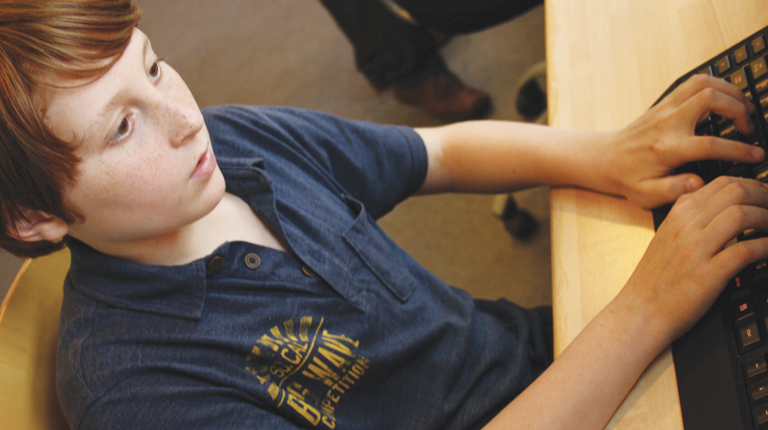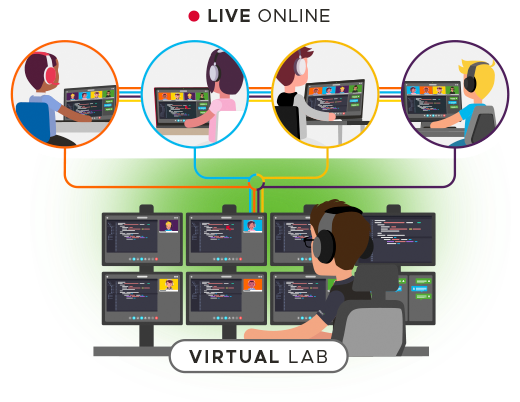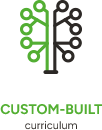A learning
journey
We assess each child as an individual and recommend a tailored tech learning path that will enable them to unlock their full potential.


Unlock your child’s potential with our PureCoder series. Our virtual programming classes begin with the core essentials, helping your child build confidence and a strong understanding of coding. Those who wish to develop their coding further can then progress to advanced, professional-level skills.
On PureCoder Level 1, the first level of our coding series, your child will gain a comprehensive understanding of fundamental programming concepts in Python.
After learning how to write efficient procedural oriented programs, they will apply their knowledge to solve realistic problems. Good coding practices will be encouraged from day one to ensure they write readable high-quality code.
By ensuring your child is confident with each concept before moving on, they will complete the course with a strong understanding of how to interpret code and program in one of the most popular languages, Python.
£272.50
(10 payments)
Total cost: £2725
Assessment Lesson (credited upon enrolment): £35.00 | Enrolment Fee: £55.00 | Catch up lesson: £50.00*
* Catch up fees are correct for the current academic year, please see all course fees, for details of any upcoming fee changes.
On the PureCoder Level 2 course, your child will be introduced to one of the most popular programming paradigms, object orientation.
After mastering object oriented techniques, they will explore graphical user interfaces (GUIs), data structures and path finding algorithms, combining these to create truly powerful programs.
By the end of the course, your child will be able to confidently code using object-orientation, GUIs, data structures, algorithms and more; techniques used in professional coding industries, including game development, commercial, statistics and data analysis, every day.
£284.50
(10 payments)
Total cost: £2845
Assessment Lesson (credited upon enrolment): £35.00 | Enrolment Fee: £55.00 | Catch up lesson: £50.00*
* Catch up fees are correct for the current academic year, please see all course fees, for details of any upcoming fee changes.
During this year-long course, your child will use all the skills learnt so far to develop a game engine (a coded library of tools that can be used as a base to create multiple other games).
Building on their fundamental and object-oriented programming skills, your child will explore the maths behind vectors, velocity and collisions to create realistic gameplay. Their skills will be further advanced as they learn to code audio, animations, user interfaces, events, and more.
At the end of the course, your child will be able to code a project that demonstrates how valuable their skills are in creating real-life projects, namely a range of games powered by their own game engine.
£296.50
(10 payments)
Total cost: £2965
Assessment Lesson (credited upon enrolment): £35.00 | Enrolment Fee: £55.00 | Catch up lesson: £50.00*
* Catch up fees are correct for the current academic year, please see all course fees, for details of any upcoming fee changes.
On PureCoder Level 4 your child will learn C++, a low-level coding language that will push them to understand code at a much deeper level.
Whilst the coding logic is the same in all languages, your child will progress from a simple and intuitive coding language (Python) to a more complex, intricate and dynamic coding language (C++), ensuring they are proficient in both core styles of coding languages.
Memory management, pointers and libraries are just some of the topics your child will cover, giving them much greater insight of how code works.
By the end of this year-long course, your child will be a master in two very different coding languages; low-level C++ and high-level Python.
£315.50
(10 payments)
Total cost: £3155
Assessment Lesson (credited upon enrolment): £35.00 | Enrolment Fee: £55.00 | Catch up lesson: £55.00*
* Catch up fees are correct for the current academic year, please see all course fees, for details of any upcoming fee changes.
PureCoder Level 5 will take your child into the world of professional game development.
Whether your child is serious about getting into the game development industry, would like to create their own games or broaden their coding skillset. They’ll learn the technical and programming skills required to develop breath-taking games from the ground up.
Using C++, blueprints, vector mathematics and game design to create realistic game simulations, they’ll discover the mathematics behind procedural generation, infinite worlds and much more.
This year-long course is the perfect way to give your child real-world insight into industry-standard coding, building their coding skills to a new level.
£327.50
(10 payments)
Total cost: £3275
Assessment Lesson (credited upon enrolment): £35.00 | Enrolment Fee: £55.00 | Catch up lesson: £60.00*
* Catch up fees are correct for the current academic year, please see all course fees, for details of any upcoming fee changes.
Our PureCoder series Level 6 course introduces your child to the world of Artificial Intelligence and Machine Learning. They will create their own chatbot using natural language processing and neural networks.
Next, they will explore the inner workings of neural networks, understand the math behind them, and build their own flexible models.
Finally, your child will uncover the secrets of game AI through reinforcement learning, training AI to play various games by understanding game states and actions.
£339.50
(10 payments)
Total cost: £3395
Assessment Lesson (credited upon enrolment): £35.00 | Enrolment Fee: £55.00 | Catch up lesson: £60.00*
* Catch up fees are correct for the current academic year, please see all course fees, for details of any upcoming fee changes.
No shortcuts. No blocks. No copy-paste. Just clean, structured code written line by line, and the understanding to explain every part of it.
This one-year course combines both PC01 and PC02 into a single, focused pathway for students ready to move beyond project-led coding and into the real discipline of software development.
It’s ideal for children who enjoy logic, want to understand how code truly works, and are ready for a more technical, no-frills approach – it’s about learning to think like a programmer, writing Python code from the ground up with clarity and intent.
Your child will begin with the fundamentals of procedural programming: variables, loops, conditionals, functions and lists. From there, they’ll advance on to object-oriented design, graphical user interfaces (GUI), data structures and classic algorithms, learning how to write clean, efficient and reusable code
Along the way, they’ll learn how to plan, write, debug and test their programs independently, developing fluency, confidence and problem-solving skills that go far beyond just getting code to run.
By the end of this FastTrack, your child will be confidently writing Python code with purpose and precision, using industry standard techniques and fully prepared to tackle the advanced programming of PureCoder Level 03.
Foundational Programming
Logic and Control Flow
Loops and Iteration
Functions and Modular Thinking
Working with Data
Visual Programming and Output
Graphical User Interfaces (GUI)
Object-Oriented Programming
Algorithms and Problem Solving
£454.50
(10 payments)
Total cost: £4545
Assessment Lesson (credited upon enrolment): £35.00 | Enrolment Fee: £55.00 | Catch up lesson: £50.00*
* Catch up fees are correct for the current academic year, please see all course fees, for details of any upcoming fee changes.

FunTech Virtual Labs gives your child the freedom to learn cutting-edge coding and tech skills wherever you are.
Our tutors can see your child's screen for the entire lesson, that's why FunTech Virtual Labs are different to the others. It allows tutors to respond immediately if your child needs support, give them a nudge if their attention wanders or set them a new task if they finish ahead of the rest.
We assess each child as an individual and recommend a tailored tech learning path that will enable them to unlock their full potential.
Engagement and technology are at the core of our teaching strategies, with small class sizes guided by technology subject specialists.
We have a structured, project-based curriculum that’s continuously refined by our in-house development team to keep it ahead of the curve.
Using a state-of-the-art virtual learning platform, we deliver tutor-led classes in real-time with a 1:4 tutor student ratio.
FAQs
A virtual class is a scheduled interactive online lesson delivered by FunTech.
All our virtual software is Citrix driven and so extremely safe
All students receive a virtual orientation lesson before the start of their course.
For each lesson, your child will receive an email invitation containing a link allowing them to log onto our virtual classroom. We schedule a maximum of four students who are predominately based in the UK, however, a few of our students have moved abroad due to parents work commitments and therefore log in from further afield.
The lessons themselves are the exact same as is delivered in a physical classroom. Through our virtual classroom environment, your child has the option to raise their hand, ask questions and also speak to the other students in their class (though we do have a mute all option '- just in case!)
FunTech teachers are able to pass control of their monitor to an individual student or share it amongst all the students. With permission, we can take control of a students' monitor to demonstrate concepts, share common mistakes or outstanding work as we would in a physical classroom.
All our virtual software is Citrix driven and so extremely safe
Good internet connection, headphones with a microphone and a computer.
All our virtual software is Citrix driven and so extremely safe




